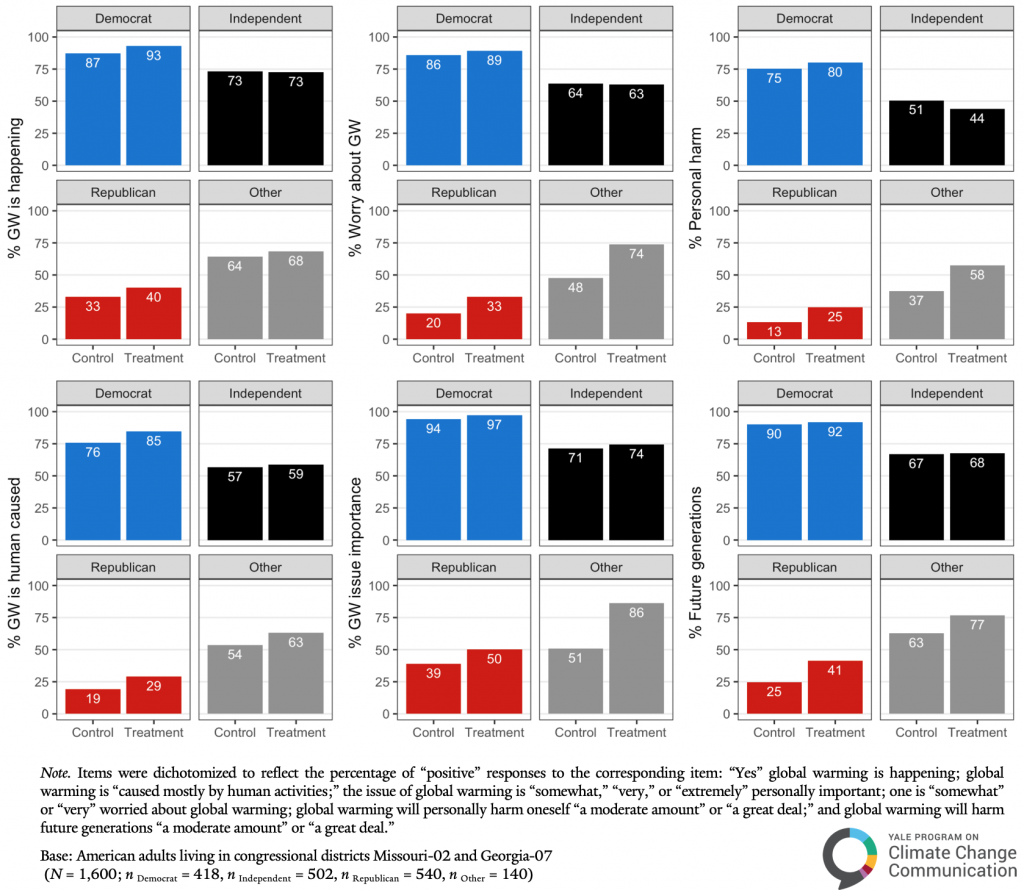Peer-Reviewed Article · Jun 14, 2021
Shifting Republican views on climate change through targeted advertising
By Matthew Goldberg, Abel Gustafson, Seth Rosenthal and Anthony Leiserowitz
Filed under: Audiences, Beliefs & Attitudes, Messaging and Policy & Politics

We are pleased to announce the publication of a new article, “Shifting Republican views on climate change through targeted advertising” in the journal Nature Climate Change.
Enacting ambitious and durable climate policy will likely require bipartisan support. Although our research shows that Democrats increasingly think climate change should be a high priority for the president and Congress, issue priority has remained stagnant among Republicans. Increasing Republicans’ understanding of the existence, causes, and harms of climate change is a foundation on which to build bipartisan climate policy support.
In support of Fenton Communications and other partner organizations, we helped develop New Climate Voices—a campaign designed to convince Republicans that climate change is happening, human-caused, and harmful. The campaign involved one month (July 19–August 20, 2019) of targeted video and banner advertising delivered to conservatives in two competitive congressional districts: Missouri-02 and Georgia-07. Advertisements were displayed on YouTube, Facebook, and on websites across the Internet.
The advertisements featured messengers and content that were expected to be effective with this audience. In one video, Dr. Katharine Hayhoe, a climate scientist and evangelical Christian, speaks about the connection between her Christian faith and climate change. In another video, Air Force General Ron Keys explains that climate change poses a national security threat and creates challenges for the U.S. military. In another, former U.S. Congressman Bob Inglis (R–SC) describes how his conservative values inspire his drive for climate action.
The campaign had large positive effects on the climate change beliefs and attitudes of Republicans in the two congressional districts. Relative to control groups that did not receive the advertising, the treated groups exhibited a seven percentage point increase in belief that global warming is happening, a 10 point increase in understanding that global warming is human-caused, an 11 point increase in global warming issue importance, a 13 point increase in worry about global warming, a 12 point increase in perceptions of personal harm, and a 16 point increase in perceptions of harm to future generations.
The campaign also had large effects among people who reported they do not affiliate with any political party, although these estimates are less certain due to the smaller sample size of this group. The campaign had little effect among Democrats and Independents. This was expected because the campaign was not targeted towards or designed to convince those audiences.
Effects of the New Climate Voices campaign
This field experiment finds that targeted advertising can persuade people of the existence, causes, and harms of climate change. Further, the findings demonstrate that successful climate change messaging is not limited to controlled laboratory settings, but can also have significant effects outside the laboratory, even in competitive congressional districts. This study underscores the importance of climate change communication that is both persuasive and scalable.
The full article is available here to those with a subscription to Nature Climate Change. If you would like to request a copy, please send an email to climatechange@yale.edu with the subject line: Request New Climate Voices paper.
